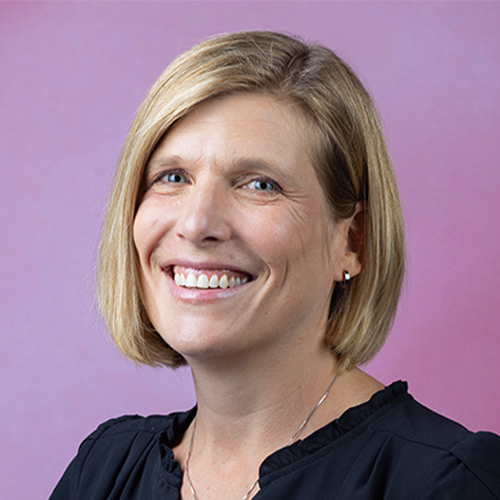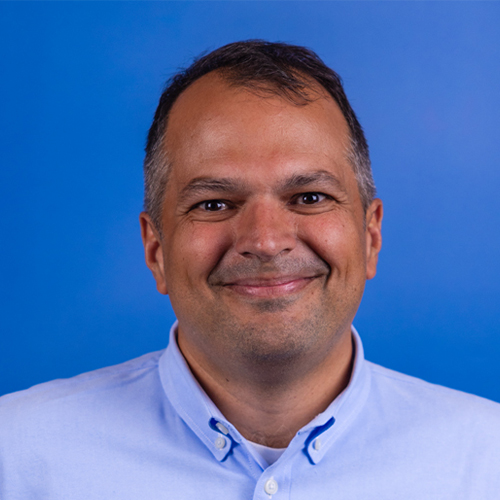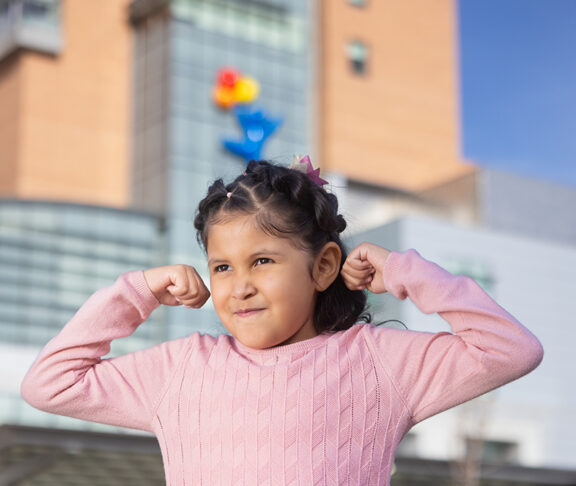For children facing relapsed or treatment-resistant cancers, clinical trials aren’t just research — they’re care, hope, and often the only path forward. At Children’s Hospital Colorado’s Experimental Therapeutics Program (ETP), families gain access to groundbreaking therapies and novel treatment approaches, supported by a team dedicated to delivering tomorrow’s medicine today.
“Your child’s cancer is back.”
“The treatment didn’t work.”
For parents, there may be no harder words to hear. When standard therapies fail, families must turn to the very frontier of medicine. Many find that frontier nestled in the Rocky Mountains at Children’s Hospital Colorado’s Experimental Therapeutics Program (ETP) — a place where pediatric oncologists, advanced practice providers, nurses, and pharmacists, supported by psychologists and social workers, are pushing care forward, one clinical trial at a time.
The engine of progress for pediatric cancer

Dr. Meg Macy
ETP Program Leader at Children’s Hospital Colorado and Professor of Pediatrics at University of Colorado Anschutz Medical Campus
“Pediatric cancer is, by definition, a rare disease, which means we have to learn as much as we can from every single patient,” explained Dr. Meg Macy, ETP program leader and Professor of Pediatrics at the University of Colorado Anschutz Medical Campus. That learning has already transformed survival. Childhood leukemia, once almost universally fatal, now has cure rates approaching 95% and even higher for some patients, an incredible achievement that means more children will live to be adults. “How did we do that? It was by learning from each patient through clinical trials,” she reflected. ”Child health research is at the core of Children’s Colorado’s commitment to deliver the best clinical care for kids.”
Unlike adult cancers, where large patient populations allow faster data collection, pediatric cancer research depends on collaboration. The early-phase clinical trials run by Dr. Macy and her colleagues in the ETP at Children’s Colorado offer a powerful exchange: Children receive access to therapies unavailable in standard care settings while doctors refine drug safety, dosing, and effectiveness, which will ultimately help more children and families. For some of our patients, this opportunity provides hope for a healthy future when options are limited.
One of the most promising efforts is CAR-T cell therapy, which takes a child’s own immune cells, re-engineers them in the lab, and trains them to recognize and attack cancer. This approach has already revolutionized treatment for leukemia and lymphoma, and the ETP is now working with the Children’s Colorado cell therapy team to bring its benefits to children with brain and solid tumors, where options remain scarce.
Beyond cell therapies, the program is testing precision approaches, such as targeted drugs that shut down cancer-driving proteins and carefully designed drug combinations matched to each child’s unique tumor profile.
Meaning beyond medicine
For many families, coming to Colorado to enroll their child in a clinical trial gives them hope — and a feeling that they’re giving their child the best chance to beat their cancer. It’s also about more than medicine; it’s about turning over every stone, fighting for more time, and contributing to future cures.

Dr. Navin Pinto
Attending Physician at Children’s Hospital Colorado and Professor of Pediatrics at University of Colorado Anschutz Medical Campus
Dr. Navin Pinto, Dr. Macy’s colleague in the ETP, an attending physician at Children’s Hospital Colorado, and a Professor of Pediatrics at the University of Colorado Anschutz Medical Campus, where he also serves as medical lead of the Gates Institute, which specializes in developing gene therapies, reflected, “We are endlessly grateful to the families who have taken part in clinical trials. Their hope, courage and generosity are the foundation of every medical breakthrough, leading to more lives saved.”
This legacy is measured not only in miracle outcomes but also in small victories. Drs. Macy and Pinto keep “happy walls” in their offices, covered with photos sent by families: first days of kindergarten, high school graduations, once-in-a-lifetime trips. Some children are thriving years later, their cancer in the rearview mirror. Others gained precious milestones when time was short. Both kinds of stories remind the care teams — and families — that every trial and every patient matters.
The ETP typically has about 35 open trials at any given time, many of them first-in-children studies not available anywhere else. ETP’s work has helped lead to FDA approval of four different drugs for childhood cancer in the past 15 years. While each trial may enroll only a handful of patients, together they push the boundaries of what’s possible in pediatric cancer care.
If your child has a relapsed or treatment-resistant cancer, or if you want to learn more about novel therapies and clinical trials, visit childrenscolorado.org/cancer and clinicaltrials.gov.




